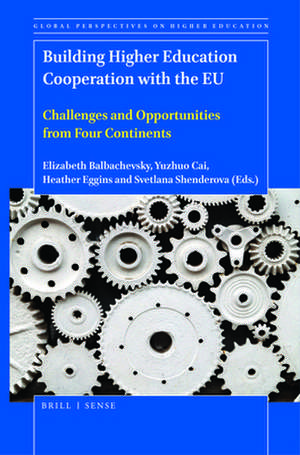Building Higher Education Cooperation with the EU: Challenges and Opportunities from Four Continents: Global Perspectives on Higher Education, cartea 49
Editat de Elizabeth Balbachevsky, Yuzhuo Cai, Heather Eggins, Svetlana Shenderovaen Limba Engleză Paperback – 16 dec 2020
Din seria Global Perspectives on Higher Education
-
 Preț: 417.09 lei
Preț: 417.09 lei -
 Preț: 407.20 lei
Preț: 407.20 lei -
 Preț: 401.36 lei
Preț: 401.36 lei -
 Preț: 402.91 lei
Preț: 402.91 lei -
 Preț: 405.02 lei
Preț: 405.02 lei -
 Preț: 404.31 lei
Preț: 404.31 lei -
 Preț: 395.54 lei
Preț: 395.54 lei -
 Preț: 393.90 lei
Preț: 393.90 lei -
 Preț: 416.46 lei
Preț: 416.46 lei -
 Preț: 421.17 lei
Preț: 421.17 lei -
 Preț: 394.82 lei
Preț: 394.82 lei -
 Preț: 389.45 lei
Preț: 389.45 lei -
 Preț: 410.56 lei
Preț: 410.56 lei - 19%
 Preț: 563.87 lei
Preț: 563.87 lei -
 Preț: 385.17 lei
Preț: 385.17 lei - 19%
 Preț: 573.53 lei
Preț: 573.53 lei -
 Preț: 403.83 lei
Preț: 403.83 lei - 19%
 Preț: 569.50 lei
Preț: 569.50 lei -
 Preț: 428.14 lei
Preț: 428.14 lei -
 Preț: 417.40 lei
Preț: 417.40 lei -
 Preț: 410.56 lei
Preț: 410.56 lei -
 Preț: 424.52 lei
Preț: 424.52 lei -
 Preț: 403.36 lei
Preț: 403.36 lei -
 Preț: 394.10 lei
Preț: 394.10 lei - 19%
 Preț: 576.04 lei
Preț: 576.04 lei -
 Preț: 395.46 lei
Preț: 395.46 lei -
 Preț: 420.97 lei
Preț: 420.97 lei -
 Preț: 399.09 lei
Preț: 399.09 lei -
 Preț: 412.18 lei
Preț: 412.18 lei -
 Preț: 398.71 lei
Preț: 398.71 lei -
 Preț: 406.92 lei
Preț: 406.92 lei -
 Preț: 401.36 lei
Preț: 401.36 lei -
 Preț: 306.36 lei
Preț: 306.36 lei -
 Preț: 346.79 lei
Preț: 346.79 lei -
 Preț: 308.46 lei
Preț: 308.46 lei -
 Preț: 347.27 lei
Preț: 347.27 lei -
 Preț: 306.93 lei
Preț: 306.93 lei
Preț: 331.88 lei
Nou
Puncte Express: 498
Preț estimativ în valută:
63.50€ • 66.30$ • 52.56£
63.50€ • 66.30$ • 52.56£
Carte indisponibilă temporar
Doresc să fiu notificat când acest titlu va fi disponibil:
Se trimite...
Preluare comenzi: 021 569.72.76
Specificații
ISBN-13: 9789004445406
ISBN-10: 9004445404
Dimensiuni: 155 x 235 mm
Greutate: 0.34 kg
Editura: Brill
Colecția Brill
Seria Global Perspectives on Higher Education
ISBN-10: 9004445404
Dimensiuni: 155 x 235 mm
Greutate: 0.34 kg
Editura: Brill
Colecția Brill
Seria Global Perspectives on Higher Education
Notă biografică
Elizabeth Balbachevsky is Associate Professor at the Department of Political Science at the University of São Paulo (USP), São Paulo, Brazil and academic director of the Research Center on Public Policy at the USP's Institute of Advanced Studies (NUPPs/IEA-USP).
Yuzhuo Cai is a Senior Lecturer and Adjunct Professor at Faculty of Management and Business, Tampere University, Finland. He has published over 100 scholarly publications in the fields of higher education and innovation studies often approached by organization theories.
Heather Eggins is Visiting Professor and Senior Research Fellow at Staffordshire University, UK and Fellow Commoner at Lucy Cavendish College, University of Cambridge. She was a Fulbright New Century Scholar, Director of SRHE and publishes widely on HE policy.
Svetlana Shenderova is a Researcher, Faculty of Management and Business, Tampere University, Finland. She has worked for 30 years in research, consulting and expertise in higher education policies and university governance focusing on transaction costs of EU-Russian internationalisation.
Yuzhuo Cai is a Senior Lecturer and Adjunct Professor at Faculty of Management and Business, Tampere University, Finland. He has published over 100 scholarly publications in the fields of higher education and innovation studies often approached by organization theories.
Heather Eggins is Visiting Professor and Senior Research Fellow at Staffordshire University, UK and Fellow Commoner at Lucy Cavendish College, University of Cambridge. She was a Fulbright New Century Scholar, Director of SRHE and publishes widely on HE policy.
Svetlana Shenderova is a Researcher, Faculty of Management and Business, Tampere University, Finland. She has worked for 30 years in research, consulting and expertise in higher education policies and university governance focusing on transaction costs of EU-Russian internationalisation.
Recenzii
"International cooperation in higher education is not new, but gained new urgency in recent years, with the expansion of the knowledge economy, the easy flow of communications and the emulation created by international rankings. In the European Union’s countries, international competition and the process of political and economic unification required national higher education institutions to give priority to international cooperation, while large countries such as Russia, China, Brazil and South Africa intensified their effort to modernize their institutions and link them to the international flow of science, technology and talent, leading similar trends in other countries in their regions. [..] These global trends are shaped by the national culture and institutions of each country, and the existing national and international cooperation policies and instruments on all sides. In this groundbreaking book, the authors look at how these interactions occur from the perspectives of the European Union and the countries involved and make recommendations on policies that could make international cooperation more fluid and beneficial to all parts involved." – Simon Schwartzman
